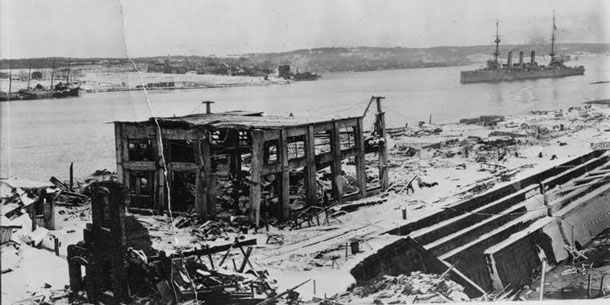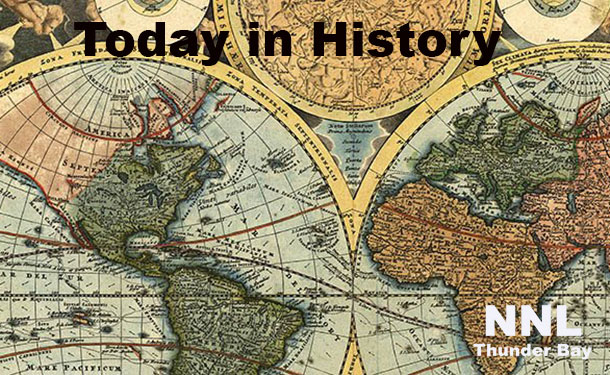December 7th – “A Day that will live down in infamy”
Seventy-three years ago today, three waves of Japanese planes launched from aircraft carriers attacked the United States Naval Base at Pearl Harbour.
President Franklin D. Roosevelt appeared before Congress the next day and declared “December 7th will live down in infamy”.
The Japanese Attack on Pearl Harbour became a huge rallying point for the United States. The Pearl Harbour attack changed the course of the war in the Pacific, and globally. Germany declared war on America, bringing the US into the war.
While many Americans think World War Two started after the December 7 1941 attack the reality is the war started in September 1939 with the declaration of war against Germany by Britain and France, and a few days later by Canada and Australia.
Halifax – December 7

On December 7, the navy’s leaders counted their human casualties as well as the damage to their young fleet. The dockyard was a wreck, with move buildings damaged and many destroyed.
In his military history of the Explosion, John Griffith Armstrong writes: “Niobe looked as if she had been through a battle…Despite the obvious damage, the ship was structurally intact. Still, the job of putting her back in order would be a daunting challenge: clearing wreckage from the deck alone would occupy two full days.”
Niobe had given partial shelter from the blast to some smaller RCN ships, but the damage was still extensive, and many sailors were hurt by flying glass.
Canada’s Royal Naval College was a wreck. The students at the college were writing exams that week and the day’ session was starting late: the change of schedule saved lives.
Both the college and the Fleet Wireless School were moved out of Halifax after the Explosion.
The roof of the military hospital at Admiralty House (now a military museum and archive) collapsed, but doctors continued to work until that night, when the building was finally evacuated and patients moved elsewhere.
Surgeon Joseph Rousseau was himself bleeding from cuts to his head, face, chest, arms, and jugular vein, but he carried on until he collapsed from loss of blood. When navy nurse Alice Boutin was carried off the job on the evening of December 6, she was found to have a fractured rib and a dislocated shoulder.
Events in History on December 7
- 43 BC – Marcus Tullius Cicero is assassinated.
- 574 – Emperor Justin II retires due to recurring seizures of insanity. He abdicates the throne in favor of his general Tiberius, proclaiming him Caesar.
- 1703 – The Great Storm of 1703, the greatest windstorm ever recorded in the southern part of Great Britain, makes landfall. Winds gust up to 120 mph, and 9,000 people die.
- 1724 – Tumult of Thorn: Religious unrest is followed by the execution of nine Protestant citizens and the mayor of Thorn (Toruń) by Polish authorities.
- 1732 – The Royal Opera House opens at Covent Garden, London, England.
- 1776 – Gilbert du Motier, Marquis de Lafayette, arranges to enter the American military as a major general.
- 1787 – Delaware becomes the first state to ratify the United States Constitution.
- 1862 – American Civil War: Battle of Prairie Grove, Arkansas.
- 1869 – American outlaw Jesse James commits his first confirmed bank robbery in Gallatin, Missouri.
- 1917 – World War I: The United States declares war on Austria-Hungary.
- 1930 – W1XAV in Boston, Massachusetts telecasts video from the CBS radio orchestra program, The Fox Trappers. The telecast also includes the first television commercial in the United States, an advertisement for I.J. Fox Furriers, who sponsored the radio show.
- 1936 – Australian cricketer Jack Fingleton becomes the first player to score centuries in four consecutive Test innings.
- 1941 – World War II: Attack on Pearl Harbor – The Imperial Japanese Navy carries out a surprise attack on the United States Pacific Fleet and its defending Army and Marine air forces at Pearl Harbor, Hawaii. (For Japan’s near-simultaneous attacks on Eastern Hemisphere targets, see December 8.)
- 1946 – A fire at the Winecoff Hotel in Atlanta, Georgia, kills 119 people, the deadliest hotel fire in U.S. history.
- 1949 – Chinese Civil War: The government of the Republic of China moves from Nanking to Taipei, Taiwan.
- 1962 – Prince Rainier III of Monaco revises the principality’s constitution, devolving some of his power to advisory and legislative councils.
- 1963 – Instant replay makes its debut during an American Army–Navy football game.
- 1965 – Pope Paul VI and Patriarch Athenagoras I simultaneously revoke mutual excommunications that had been in place since 1054.
- 1975 – Warschauer Kniefall – German Chancellor Willy Brandt makes a gesture of humility towards the victims of the Warsaw Ghetto Uprising.
- 1972 – Imelda Marcos survives an assassination attempt using a bolo knife against her.
- 1971 – Pakistan President Yahya Khan announces the formation of a coalition government with Nurul Amin as Prime Minister and Zulfikar Ali Bhutto as Deputy Prime Minister.
- 1972 – Apollo 17, the last Apollo moon mission, is launched. The crew takes the photograph known as The Blue Marble as they leave the Earth.
- 1975 – Indonesian invasion of East Timor: The invasion begins.
- 1982 – In Texas, Charles Brooks, Jr., becomes the first person to be executed by lethal injection in the United States.
- 1983 – An Iberia Airlines Boeing 727 collides with an Aviaco DC-9 in dense fog while the two airliners are taxiing down the runway at Madrid–Barajas Airport, killing 93 people.
- 1987 – Pacific Southwest Airlines Flight 1771 crashes near Paso Robles, California, killing all 43 on board, after a disgruntled passenger shoots his ex-boss traveling on the flight, then shoots both pilots and himself.
- 1988 – Spitak Earthquake: In Armenia an earthquake measuring 6.9 on the Richter scale kills more than 25,000, injures 30,000 and leaves 500,000 homeless out of a population of 3,500,000.
- 1988 – Yasser Arafat recognizes the right of Israel to exist.
- 1993 – The Long Island Rail Road massacre: Passenger Colin Ferguson murders six people and injures 19 others on the LIRR in Nassau County, New York.
- 1995 – The Galileo spacecraft arrives at Jupiter, a little more than six years after it was launched by Space Shuttle Atlantis during Mission STS-34.
- 1999 – A&M Records, Inc. v. Napster, Inc.: The Recording Industry Association of America sues the peer-to-peer file-sharing service Napster, alleging copyright infringement.
- 2003 – The Conservative Party of Canada is officially registered, following the merger of the Canadian Alliance and the Progressive Conservative Party of Canada.
- 2005 – Rigoberto Alpizar, a passenger on American Airlines Flight 924 who allegedly claimed to have a bomb, is shot and killed by a team of U.S. federal air marshals at Miami International Airport.
- 2005 – Ante Gotovina, a Croatian army general accused of war crimes but later acquitted, is captured in the Playa de las Américas, Tenerife, by Spanish police.
- 2006 – A tornado strikes Kensal Green, North West London, seriously damaging about 150 properties.
- 2007 – The Hebei Spirit oil spill begins in South Korea after a crane barge that had broken free from a tug collides with the Very Large Crude Carrier, Hebei Spirit.
Source: Wikipedia.
VIDEO by associatedpress

